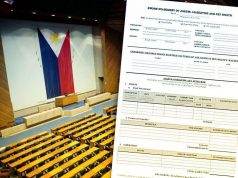There is no right to immigration
If to migrate means leaving one’s country, then one is entitled to do so. Our own Constitution provides that the right to choose one’s abode or to travel cannot be impaired except by court order or by law in the interest of national security, public safety, or public health, respectively.
However, if to migrate means being able to demand entry and then reside in another country, then no such right exists. Entry into State borders is not for international law to say but of individual national laws.
For the Philippines, foreigners can enter the country subject to legal requirements and even then their rights are limited. To get the full rights of a citizen, Philippine laws require the foreigner applicant to reside in the country for at least 10 years, is at least 21 years old, have a business or trade, can speak and write in English or Filipino, and possess a modicum of civics knowledge.
Before continuing, a note as to terminology:
Migrants — are those who voluntarily leave their country for better work or living.
Refugees — are people who involuntarily left their country due to dangers brought about by armed conflict or political or religious persecution.
Asylum seeker — is one who claims to be a refugee but whose status as such is yet to be verified by the proper authorities.
Of course, one main difference between migrants and refugees is that the latter generally cannot return safely to his or her country of origin.
The Convention Relating to the Status of Refugees (otherwise known as the 1951 Refugee Convention, which the Philippines acceded to — along with the Protocol — in 1981), provides that people who committed a crime against peace, a war crime, or a crime against humanity, or has committed a serious nonpolitical crime outside the country of refuge prior to his admission to that country are not considered as refugees.
Is there a right to claim asylum? Britannica puts it this way: “It is the right of a state to grant asylum to an individual, but it is not the right of an individual to be granted asylum by a state. This perspective is reflected in the Universal Declaration of Human Rights (UDHR), which, though recognizing (article 14) the right ‘to seek and to enjoy in other countries asylum from persecution,’ does not explicitly provide a right of asylum.”
“The original draft of that article, which referred to the individual’s right ‘to seek and to be granted asylum from persecution,’ would have afforded more protection to asylum seekers. Similarly recognizing that ‘the grant of asylum may place unduly heavy burdens on certain countries,’ the Convention Relating to the Status of Refugees, which was adopted by the United Nations (UN) Conference of Plenipotentiaries on the Status of Refugees and Stateless Persons in 1951, did not create a right of asylum for those seeking it, and the impressive array of rights it enumerates pertains only to those refugees ‘lawfully in’ or ‘lawfully staying in’ the sheltering state.”
“Subsequent unsuccessful efforts to articulate an individual’s right of asylum included: (1) the UN General Assembly Declaration on Territorial Asylum (1967), which contained substantive exceptions to its non-refoulement (non-return) provision (pertaining to national security and to the safeguarding of its national population), and (2) a proposed Convention on Territorial Asylum, which never materialized.”
Now this is important: international law requires that asylum seekers claim asylum in the first country they enter upon leaving their own country. If they enter such second country and then not stay but move on to another country (e.g., leaving Guatemala to enter Mexico and then traveling towards the US) then they are no longer considered asylum seekers but migrants. And as mentioned above, there is no right to migration, in the sense that no one can demand entry into another country.
Essentially it’s a matter of respecting sovereignty.
For those who retain the status of asylum seekers, International Policy Digest’s Bruce Newsome (“Immigration is a national choice not an international law,” February 2018) points out that since they are not immigrants under international law, then “they have no ‘right to remain’ under international law. The original system aims for them to receive protection in a neighbouring country until they can safely return home.”
Those are the facts. And yet in today’s politically correct, inclusive mindset, “exclusivity” has become a bad word, akin to “sovereignty.”
But as The Federalist’s Mark Earley argues, “exclusivity is necessary for meaning, identity, and accountability.”
Thus, “why would a nation need to be based, as least in part, on a principle of exclusivity? It is because nations, not unlike families, need to have some sense of identity, even purpose. When a group of people is defined as everyone and anyone, that actually means that it is no one. If everyone comes and goes as he pleases, there is a void of identity, collective belonging, commitment, responsibility, and accountability. Citizenship is a commitment.”
Jemy Gatdula is a senior fellow of the Philippine Council for Foreign Relations and a Philippine Judicial Academy law lecturer for constitutional philosophy and jurisprudence.
jemygatdula@yahoo.com
www.jemygatdula.blogspot.com
facebook.com/jemy.gatdula
Twitter @jemygatdula



